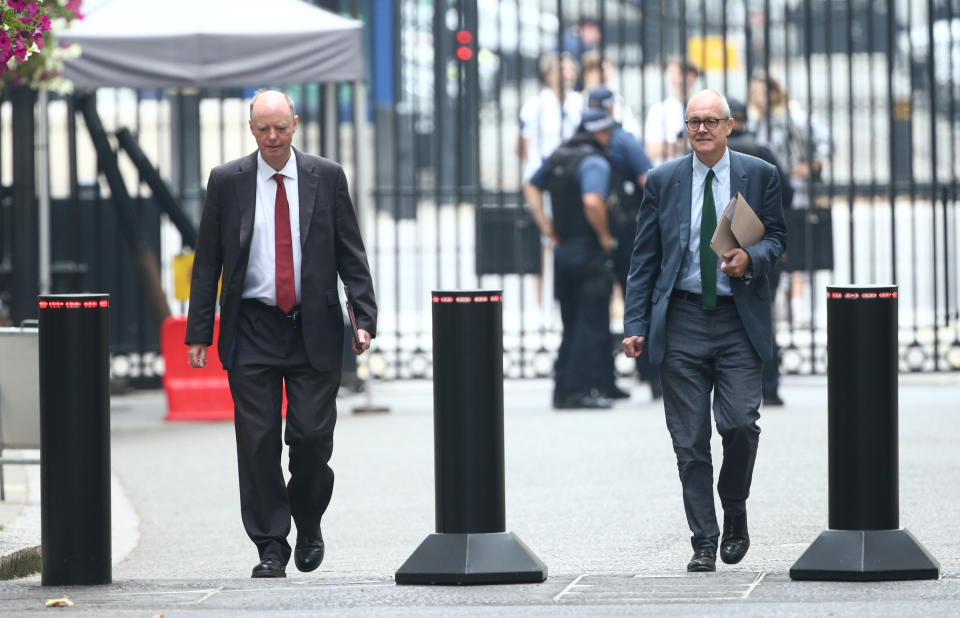England's chief medical officer fuels fears of second lockdown for UK economy

England’s chief medical officer has warned the coronavirus crisis is a “six-month problem we have to deal with collectively,” as expectations grow stricter national restrictions will be announced later this week.
Rising infection rates and the likely economic impact of stricter curbs sparked alarm among investors and firms, and sent travel, banking and housebuilding stocks tumbling as markets opened on Monday morning.
The UK government’s chief scientific adviser Patrick Vallance and England’s chief medical officer Chris Whitty gave a joint press conference live on television on Monday.
Whitty said ministers and society had to walk a “very difficult balance.” Too little action risked the virus becoming “out of control” and increased deaths, while the opposite could cause “damage to the economy, which can feed through to unemployment, to poverty, to deprivation.”
Watch: Prof Chris Whitty says ministers and society have to walk a ‘very difficult balance’
Action needed to avoid ‘exponential growth’
Vallance said an initial rise in cases among younger people had now spread to all age groups including older people, and had already begun to cause a fresh rise in hospitalisations and deaths. He said an estimated 6,000 new cases were occurring every day, and warned Britain needed, “speed,” “action,” and to do “enough” to curb cases.
Vallance added that cases had doubled in seven days, and warned if unchecked at that rate cases would reach 49,000 new infections a day by mid-October.
READ MORE: European stocks plunge on virus concerns
Whitty said “large numbers” of deaths could result if such “exponential growth” was not stopped. Cases were now rising across much of the country adding: “This is not someone else’s problem, this is all of our problem.”
He set out four measures Britain could take to reduce cases:
Take individual precautions under the ‘hands, face, space’ motto, including regular handwashing, wearing masks, and social distancing.
Self-isolate when suffering symptoms, and trace contacts.
Break “unnecessary links” between households, reducing contact including in working and social environments “in the least damaging way.”
Continue scientific work to improve vaccine, treatment and other work to understand and bring the virus under control.
It comes ahead of an expected speech by prime minister Boris Johnson on Tuesday, with UK government ministers weighing up tighter restrictions to curb the coronavirus.
The first national lockdown imposed in March wreaked havoc with the UK economy, sparking the biggest quarterly decline in GDP on record between April and June. The latest data from the Office for National Statistics (ONS) showed that while Britain’s economy continued to rebound from the deepest recession on record in July, the pace of recovery slowed more than expected — demonstrating the fragility of recovery.
Markets tumble on lockdown fears
Britain’s FTSE 100 (^FTSE) index of leading listed companies was trading 3.1% lower on Monday, on track for its worst day in three months, while the FTSE 250 (^FTMC) was down 3.2%.
“In Europe, the pandemic has come to the fore again due to the sharp increase in new COVID-19 cases across the continent,” said Milan Cutkovic, market analyst at AxiCorp.
“The UK is even considering another national lockdown, which would have disastrous effects on the economy. This is indeed the biggest fear of investors at the moment, as another economic standstill would significantly delay the recovery and hurt consumer and business confidence.”
READ MORE: Analysts say world economy could recover to pre-virus levels in mid-2021
Susannah Streeter, senior investment and markets analyst at Hargreaves Lansdown, said the FTSE 100 had been the biggest faller in Europe, with the travel industry particularly “reeling” amid lockdown fears.
British Airways owner IAG (IAG.L), plane engine maker Rolls-Royce (RR.L) lost 8% and Intercontinental Hotels Group (IHG.L) lost 5%.
Several banks seen as bellwether stocks for the UK economy also took heavy losses, though reports several global banks moved large sums of allegedly illicit cash were also weighing on banking stocks. Barclays (BARC.L) shed 6.1%, Lloyds (LLOY.L) shed 5.6%, and NatWest (NWG.L) lost 5.4%.
Stocks in several of Britain’s biggest house builders slumped on fears new restrictions will hit the UK’s property mini-boom in recent months. Barratt Developments (BDEV.L) shed 6.7%, and Persimmon (PSN.L) lost 5.7%.
Watch: What is a recession?
Second lockdown impact on businesses
The president of the British Chambers of Commerce (BCC) warned earlier this month UK firms were not ready for the “triple threat” of fresh local lockdowns, the wind-down of government support and Brexit disruption.
Ruby McGregor Smith wrote to UK prime minister Boris Johnson warning of a “difficult winter ahead” even without a resurgence of the coronavirus. The letter comes as new figures show employers have axed 695,000 staff since March, and Britain’s unemployment rate ticking higher to 4.1% between May and July.
Watch: Why job losses have risen despite the economy reopening
Small firms have also sounded the alarm over the impact of further measures, on top of regional and local lockdowns already affecting around one in five UK residents.
Mark Williams, CEO of London-based IT firm Pensar, said talk of new national lockdown rules was “terrifying for many small businesses, just as the green shoots of recovery were starting to appear.”
Ruth Bancroft, owner of Leed beauty salon Number Eleven Beauty & Wellbeing, said the prospect of new rules had been all her clients had wanted to discuss for the past few days. “We’ve even had people wanting to bring appointments forward just in case everything shuts down again.”

 Yahoo Finance
Yahoo Finance 